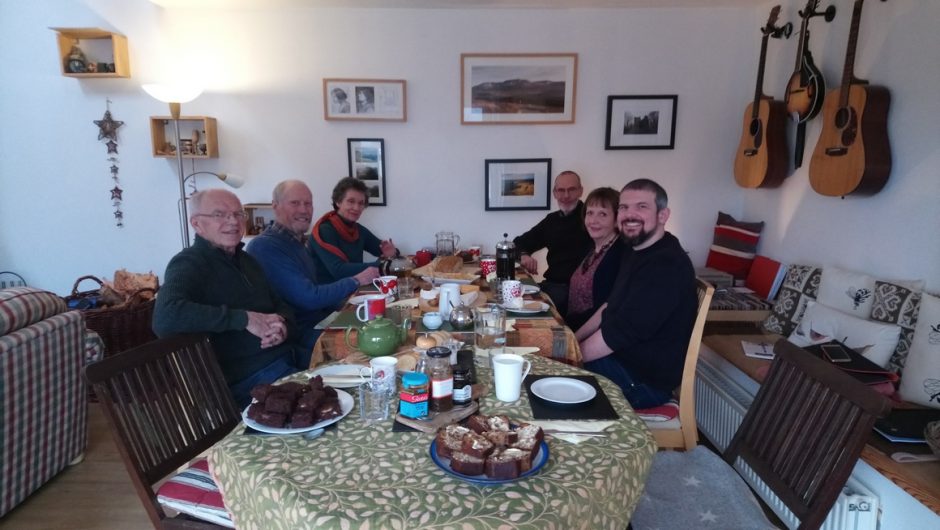The North East of Scotland has a long history of beekeeping and a large number of active beekeepers organised into associations at local and regional level. In the 70s and into the 80s the so-called Aberdeenshire “Maud” strain of bee was discovered as having native bee characteristics and traits, and lineages from this strain were spread far and wide around Scotland. It seems appropriate therefore that the North East now has a group interested in the conservation and breeding of Apis mellifera mellifera.
In the October edition of the SNHBS newsletter (and on our website) we reported that our small group of beekeepers had investigated a remote site at the Cabrach and that we planned to develop this as a mating site for native honey bees in the future.
After much reflection on last year’s efforts to test the site for isolation using virgin queens, the group members have decided to continue their efforts. The first meeting of the year took place amongst spectacular surroundings near the village of Tarland on 27 January 2019. Despite the snow and ice, folk travelled from far and wide (although the weather thwarted some journey plans).
A warming and hearty lunch was enjoyed by all, everyone having contributed something, and we all took time to get to know each other and share our ‘bee history’.
We had an agenda which we tried to stick to, but you know what beekeepers are like – always digressing into bee stories. We are an enthusiastic group and not surprisingly the most important item was answered very early on – will we carry on with our site in the Cabrach? It is such an excellent location with regards to isolation, shelter, access that the answer was a firm ‘yes’ from everyone.
We are still awaiting results of the DNA testing that some of us contributed to the SNHBS Conservation project but, in the meantime, Hugh kindly offered to assess the morphology and traits of existing stocks belonging to some of our members to establish if we have some potential native candidates within the group. We have also had kind offers of native stock to start us off from outside the group – thanks!
Hugh also shared his considerable knowledge in an impromptu power-point presentation, giving expert advice and exact timetabling for queen-rearing which was extremely informative and welcomed by the group.
Equipment in the form of Apideas, Lyson mini-nucs and stand building material was on offer from everyone and we will have another meeting to distribute it around the group so everyone can get involved. This will of course involve another lunch and time to socialise again – thank goodness for doodle poll. Once the equipment has been sorted out, two drone colonies will be prepared for the site and 20 mini-nucs prepared for the coming season. We realise this is a modest start compared to some larger operations but as we rely on volunteers checking and monitoring the bees, and as it is still a trial of sorts, this is plenty to be getting on with.
Another meeting will be arranged to set up the site, hopefully involving a sunny day, a picnic and lots of nice cakes to share.
We agreed to set up a rota to check the hives weekly during the season. With a group of 12 it won’t be too demanding a task for individuals. It’s a lovely drive on a summer evening up to the Cabrach and a very peaceful place to stop and breathe in nature.
What’s not to enjoy; like-minded folk sharing good food, good company, knowledge and experience of a subject we are all passionate about. If you are in the North East of Scotland and want to help out please get in touch.
Resources for queen rearing: some of the best books are
Vince Cook – Queen Rearing Simplified;
Jo Widdicombe – The Principles of Bee Improvement;
Wilkinson & Brown – Rearing Queen Honey Bees in a Queenright Colony (or the Ben Harden booklet – Some Alternative Pathways for the Hesitant Queen Rearer);
Laidlaw and Page – Queen Rearing and Bee Breeding; and
Dews and Milner – Breeding Better Bees (using simple modern methods).
The SNHBS website has an excellent presentation by Jon Getty (renowned Irish bee breeder) under Events/SNHBS Annual Meeting or here.
Yvonne Davidson and Ewan Campbell

